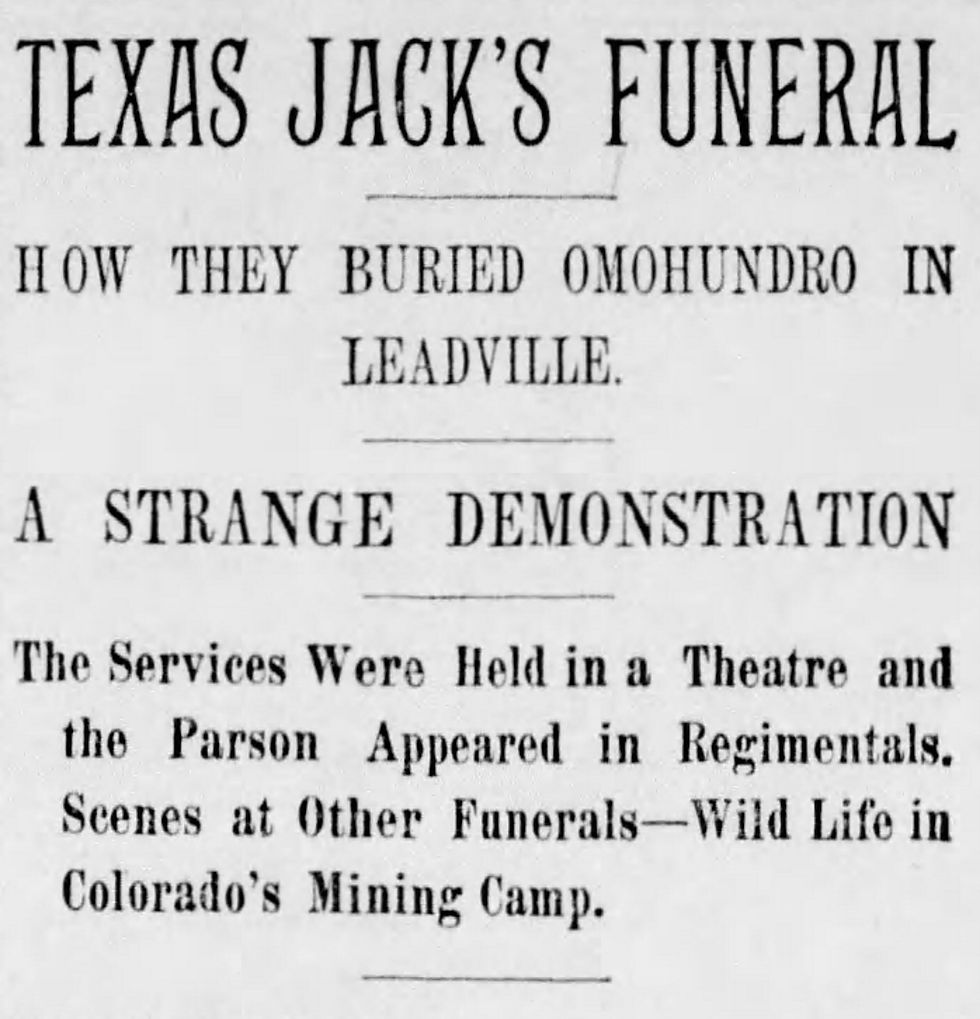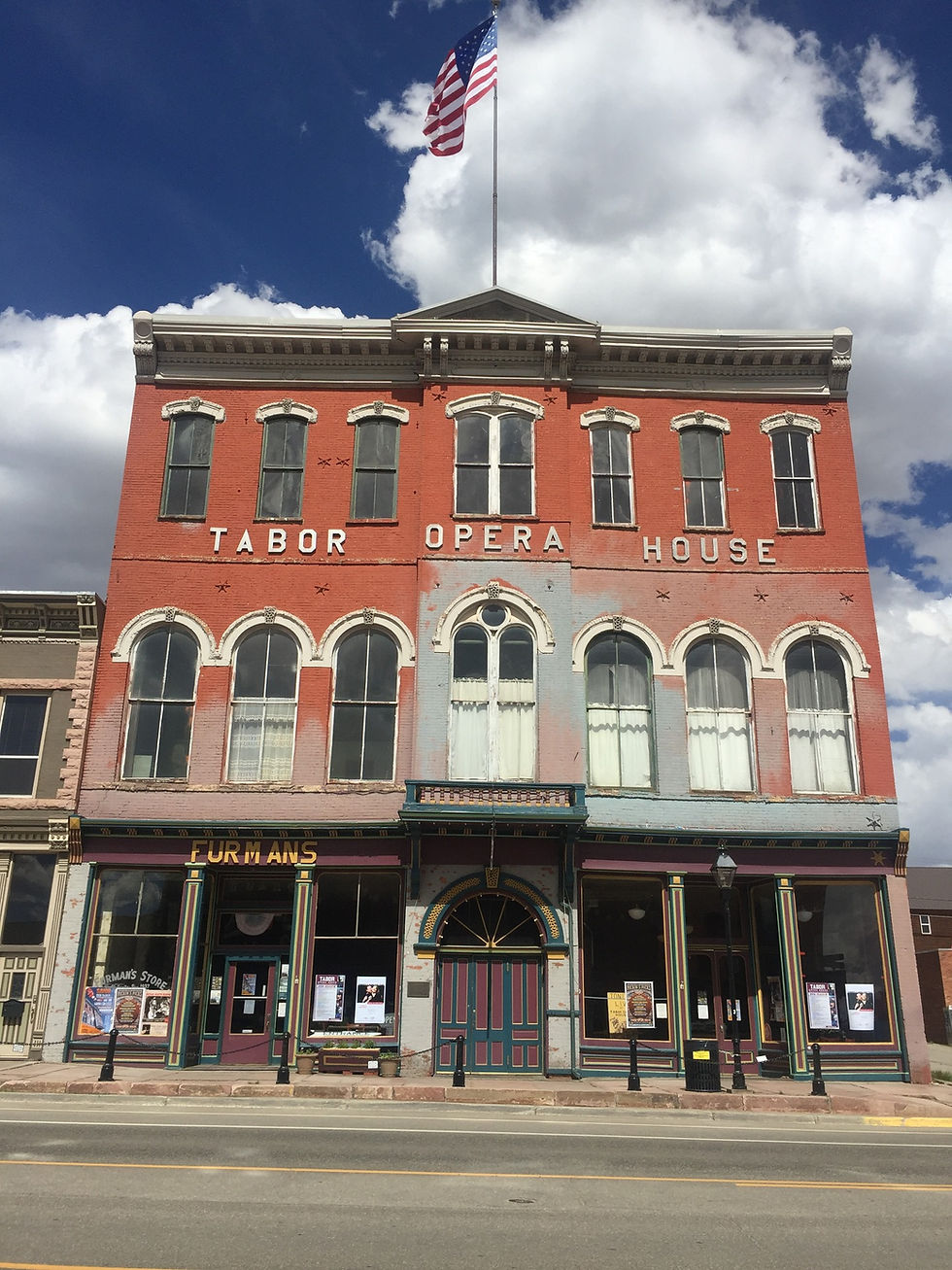Texas Jack's Funeral
- Matthew Kerns

- Jul 2, 2020
- 4 min read
Updated: Jul 2, 2022

From The Denver News - September 4, 1892.
To one who passes along the streets of Leadville, Colorado, now there is just one feature in particular which serves as a mark of comparison of the Leadville of today with the mining camp of thirteen years ago. Leadville now is respectable, staid, and as solemn as a mining city can b, but it isn't the solemnity in the abstract that strikes one now. It is the specific solemnity which concerns itself with funerals. To one who has lived in the past, when every funeral was an occasion for as much celebration as a circus, the quiet and sedate cortege moving along Chestnut Street today is something not to be considered. It is too gloomy to suit the old-timer, but alas! the old-timer is no more.

In 1879 the town was wild. Everybody carried a gun. Not in his pocket, mind you, only the natural-born fool did, and he rarely lived to repent it. The weapon was stuck in his belt right handy for immediate action. As a consequence, rarely a day passed without a violent death. Added to this the work of pneumonia kept the grave digger over in the valley at work night and day. This may sound like an exaggeration, but it isn't. The twinkling lights in the valley presented a gruesome appearance at night, and more so when their purpose was known. They lit the gravediggers at work. Pneumonia was a fearful enemy. Men were strong, fearless, healthy in the morning, and when evening came it was the physician, and the next day the undertaker. No accommodations fit to be called such were obtainable, and men after days of hard work in the mines were obliged to sleep in that frosted atmosphere wherever they could.

Reverend T. J. Mackey was the most popular clergyman in town at that time. He was loved by the good people and respected, almost venerated, by the gamblers and the miners, which doesn't imply that the miners were not in themselves reputable people. Whenever a miner or sporting man or woman died it was Parson Mackey who was called in. There was one day in particular when the parson held four funerals, and that was the record. Four was frequently equalled, but it stood as the top notch for one clergyman.
Mr. Mackey, who was an Episcopal clergyman, held services in the Tabor Opera House. Fifty dollars a day was the rent, and the collection never fell short. It was necessary to close the doors then long before the time for the beginning of the service to keep back the crowds. This four-funeral day spoken of was the day on which J. B. Omohundro, known all over the world as "Texas Jack," was buried.

Leadville never did funerals by halves. A brass band was a regular thing. No funeral was held without one. The band attending upon Jack was made up of fifty pieces, being a combination of several. Fay Templeton's opera company was playing an engagement in Leadville then, and Fay agreed to supply her company to act as choir. The coffin was set upon the stage, loaded with flowers, and flowers were rarer than rhines in Leadville, and Reverend Mr. Mackey appeared in his regimentals as chaplain of the Tabor Light Guards to preach the funeral sermon. As he proceeded, whenever he made an allusion to any good quality in Jack the congregation applauded as vociferously as though they were approving a fine feature of a play. There was no disorder—these people meant it all. They wept at the preacher's words and stamped their feet in approval of his hope for Jack's chances "over there."

Before the services, Mr. Mackey had been waited upon by the Tabor Light Guards. They recited to him the fact that all of the senior officers but the chaplain were absent from the city and told him that as he was ranking officer of the day he must don his regimentals and lead the company. At first, he demurred vigorously, but finally, equipped with blue and gold and a sword that knew not its place and the propriety of keeping it, he marched upon the stage to help Jack along.

When the services were over he found they had provided a horse for him to lead the column. The preacher wasn't the most remarkable horseman in the world, but he was game and he mounted and started away. Directly the band struck up the dead march in "Saul." the preacher and his steed became almost as prominent as the corpse—or they would have been elsewhere than in Leadville. Here everything went. The dominie waltzed to the graveyard on his fiery charger—actually waltzed. But nobody noticed that. That was a regular thing, or at least not a striking innovation.

At Omohundro's funeral, as at all funerals in Leadville, work of all kind was suspended. Men and women thronged upon the sidewalks—packed them. One could really have walked on the heads of the people and nobody would have noticed it.we


Comments